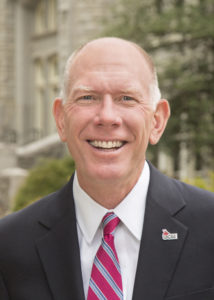By CHUCK AMBROSE

In late February, the Missouri House of Representatives’ Higher Education Committee heard testimony related to House Bill 733, which would prevent public colleges and universities from requiring students to reside in residence halls beyond one year. According to media reports, the author of the proposed legislation asserts this measure would save students money on housing, thereby outweighing other benefits institutions claim students receive from extended on-campus living requirements.
Such assumptions behind HB 733 are not only debatable from an economic standpoint, but shortsighted, particularly when considering what residential life brings to the overall value proposition of a college degree. A body of national-level and University of Central Missouri research has shown that living in university housing can be instrumental to a student’s academic success, while also providing student residents with a social support network, better integration into the campus community, and resources that can aid in their retention and timely graduation. Such benefits may contribute to 2007 to 2013 data showing a 6.1 percent increase (an average 38.39 percent to 44.56 percent) in four-year graduation rates among UCM students who resided in residence halls for two years when compared to those students who did not. Slight increases in cumulative grade-point average and course pass rates also were observed.
UCM is one of three Missouri public institutions that have adopted policies requiring students to live on campus their first two years. This requirement was implemented at the university as a part of a comprehensive college completion initiative in 2013 in response to both state and national goals to increase by 2025 the number of adults holding college degrees to 60 percent. In developing its Learning to a Greater Degree contract for student completion, UCM looked at best practices nationwide to help students who are seeking a four-year degree to cross the finish line on time (including Missouri’s first 15-to-Finish Scholarships that provide a grant in a student’s last year if they stay on track to graduate in four years) and as a result reduce their college debt load.
As part of this agreement, UCM extended its residence hall requirement from the first year only, which is the greatest period of risk for students, to two years. It also considered other measures that contribute to students’ success, including asking undergraduates to enroll in the right 15 credit hours per semester, attend class regularly, communicate with their professors, check in with their academic adviser every semester, and engage outside the classroom. The cumulative effect of these requirements leads to a stronger internal support network to help students graduate in four years, which ultimately reduces their overall college costs and the burden of debt they and their parents must bear after graduation. A positive indication that UCM is moving in the right direction is a $15.2 million decline or 22.3 percent decrease in federal loans since the 2012-2013 academic year.
When considering the cost of residence hall living, UCM and many other institutions that offer on-campus housing facilities strive to make room and board competitive with the local market. Adding to the value of the campus residence is the opportunity to have a furnished room with all utilities paid, including Wi-Fi access, and no commute to classes; easy access to amenities such as the student union, library, retail opportunities and a vast array of dining options; campus cultural, artistic, entertainment and sporting events at their front door; and the benefit of a round-the-clock Department of Public Safety to help ensure a safe living environment. Students who reside in residence halls also have an opportunity to be with peers who share similar academic and personal interests, while also providing a source of support to help them navigate through the college process and overcome issues such as isolation and anxiety that could otherwise cause them to leave college.
At a time when state financial support is declining, Missouri’s public colleges and universities continue to ensure higher education remains accessible and affordable while also focusing on their students’ success. Institutions committed to these goals deserve the opportunity to seek out the best solutions for their students, including decisions related to student housing.
Chuck Ambrose has served as University of Central Missouri president since August 2010.
Recent Stories
- UCM Founders Day rounds out semester
- New Trend: Artists switching genres
- UCM Greek Life Prepares for Greek Week
- “Xanadu”, the absurd and the heartfelt show by UCM Theatre
- Spring Break Poll
- Skinner on the Street
- SGA to hold upcoming election
- “Now that’s a party!”: A “Mean Girls” (2024) Review
- Mo’s Activity Council hosts Mean Girls actor, Daniel Franzese
- Former World Series MVP speaks at UCM First Pitch Banquet













































